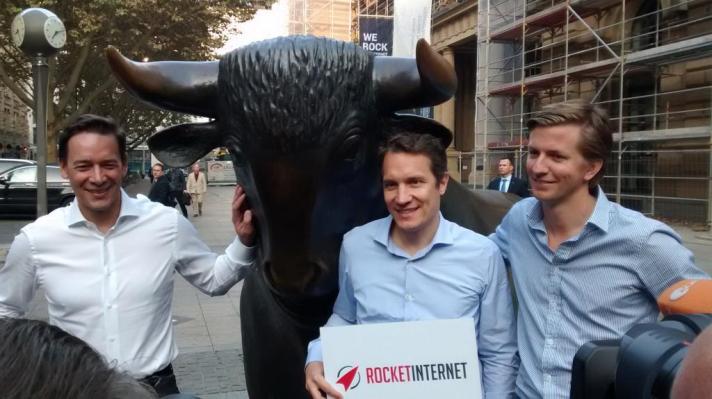If there is one thing Europe has been lacking in in the last five years or so it’s tech IPOs. London has bravely kicked things off in the last year with IPOs from companies like Just Eat. But the German markets, long ambivalent to the tech sector, are starting to re-awaken. Yesterday online apparel retailer Zalando, and Zappos competitor, debuted in Frankfurt. Today, Rocket Internet, long the ruthless ‘Darth Vader’ of the German tech scene because of it’s long history of aggressive business tactics and cloning, comes out of the gate. But the issue here is not about the past but about the future. Both companies are incredibly confident of replicating their European successes globally — something internet companies in Europe have been pining after for decades. So, first the facts.
Zalando had a meagre opening to its floatation, giving up all its earlier gains after its debut, with shares bumping around at the 21.50 euro mark at the close of trading in Frankfurt after rising as much as 14 percent. Zalando shares certainly now feel cheap in comparison to similar, floated companies.
Why cheap? Well, Europe’s few publicly traded online retailers include Asos Plc and Yoox SpA. The lack of supply could mean these stocks trading up.
The Berlin-based Zalando now has a valuation of 5.3 billion euros ($6.7 billion). The company was priced near the top end of its range, raising 605 million euros by selling as much as 11 percent of the share capital. Investors in Zalando include the Samwer brothers’ Global Founders fund and billionaires Anders Holch Povlsen of Denmark and Yuri Milner of DST.
It’s hard to compare with this the Alibaba IPO of course, which had the biggest initial public offering of all time last month. And given the nature of the companies, to compare it to Facebook’s would be nonsensical.
Zalando is of course onto a good pitch. Revenue from online shopping in Germany is expected to grow 22 percent this year and 16 percent next year to $73.5 billion, according to eMarketer, as Germany pulls out of a financial doldrums. Zalando had 2 billion euros in sales for the 12 months ended in June. The company gets more than half its revenue from Germany, Austria and Switzerland.
But it’s emerging markets where it will make the biggest gains. It should be remembered that Rocket Internet, now operates in roughly 100 countries and employs about 20,000 people.
However, although it launches around 10 new e-commerce startups a year, none of its companies world-wide are profitable yet.
You have to think of Zalando as a Zappos which has ignored the US and spread to Africa and Asia much faster. These markets are growing extremely fast, even to the US.
ROCKET MEN
Meanwhile over in the Rocket Internet camp (remember, these guys backed Zalando from the early days) shares fell as much as 13 percent on its first day of trading. It had previously set its shares at the top of its price range, vaulting it at 6.7 billion euros, or about $8.4 billion. The shares recovered slightly but were trading down nearly 4 percent by midmorning in Frankfurt.
Rocket Internet’s shares may have dipped on debut, but the company believes that doubling down long term on Latin America, Asia, and Africa will bring it untold riches, as the rest of the world goes online, especially through mobile devices. And they have a point. These guys are all about execution.
The company, based in Berlin and founded by Oliver, Marc and Alexander Samwer, owns a 65 percent stake in Rocket Internet and a 17 percent stake in Zalando through an investment company.
This means the three brothers have this week made a paper profit of about $6 billion from the Rocket Internet and Zalando IPOs. Makes you think, huh?
Rocket Internet’s I.P.O. raised roughly €1.6 billion, or double what the company was after.
WHAT NEXT?
The question is, will this week’s Zalando and Rocket IPOs create demand for offerings among other European tech companies? This of course depends on the company and where they IPO. Tele Columbus, for instance, a German cable company, said Wednesday it is planning an IPO to raise €300 million ($378.72 million).
So far, the floats have been less than spectacular, although it is early days.
But other large European, privately owned tech firms may be eying-up the performance of these floats and weighing their options.
